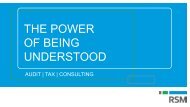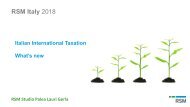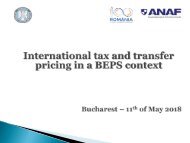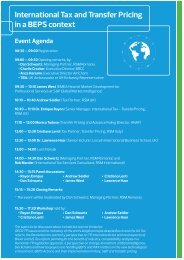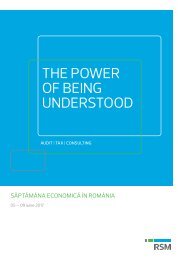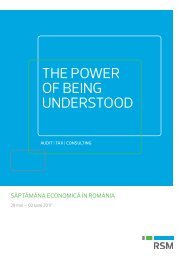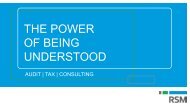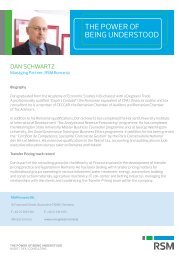Create successful ePaper yourself
Turn your PDF publications into a flip-book with our unique Google optimized e-Paper software.
MACRO<br />
• Reduced confidence in the economy<br />
The CFA <strong>Romania</strong> macroeconomic confidence index<br />
fell by 7.3 points to 58.5 points in June. The current<br />
conditions index was 71.6 points, down 5.5 points, and<br />
the expectations index fell 8.3 points to 51.9 points,<br />
the lowest level since November 2014. The expected<br />
Euro/Lei exchange rate for the next six months was<br />
4.5500 (an increase of 500 pips), and the twelvemonth<br />
forecast was 4.5375, an increase of 375 pips.<br />
The expected inflation over the next twelve months<br />
(July 2016-July 2017) was 2.00%, an increase of 0.55%<br />
on the previous financial period. CFA <strong>Romania</strong> launched<br />
its Macroeconomic Confidence Index in May 2011.<br />
Polling is conducted among financial analysts at the<br />
end of each week. The index, between 0 (complete<br />
and utter lack of any confidence whatsoever) and<br />
100 (full and unflinching confidence in the <strong>Romania</strong>n<br />
economy), is calculated based on six questions relating<br />
to current business and labour market conditions and<br />
expectations regarding the business sector, labour<br />
market, personal income, and personal wealth. The poll<br />
also gauges expectations as to the rate of inflation,<br />
interest rates, exchange rates, global macroeconomic<br />
conditions, and oil prices over the next twelve<br />
months. CFA <strong>Romania</strong> is an association of investment<br />
professionals, most of whom hold the title of Chartered<br />
Financial Analyst (CFA), a qualification administered<br />
by CFA Institute USA. CFA <strong>Romania</strong> currently has one<br />
hundred and eighty members.<br />
• More home loans in June<br />
The banks granted more mortgages in June than in<br />
the previous month, although many of them have<br />
tightened lending conditions since the Commissioning<br />
Payments Law came into force on 13 May. The amount<br />
of home loans increased by almost a billion lei in June,<br />
reaching 55.6 billion lei. The banks also benefited from<br />
state guarantees in the First Home programme in June,<br />
after the government allocated a ceiling of five hundred<br />
million lei, which, however, was quickly used up. For the<br />
banks at the top of the league in terms of assets, First<br />
Home now accounts for ninety per cent of their new<br />
mortgage portfolios. Six in ten loans are First Home<br />
loans. Such loans, with an advance payment of just<br />
five per cent, are excluded from the Commissioning<br />
Payments Law. For standard loans, the banks have<br />
increased the advance borrowers are required to pay<br />
from an average of fifteen per cent to between twenty<br />
and thirty-five per cent. Since the beginning of the<br />
year, home loans have increased by 3.7 billion lei to 24.4<br />
billion lei, while foreign currency home loans decreased<br />
by two billion lei to 31.2 billion lei. This rate of growth will<br />
be viable only if the government allocates further First<br />
Home guarantees.<br />
• Austrian investors demand “friendly” policies<br />
Around seventy per cent of Austrian investors in<br />
<strong>Romania</strong> are satisfied with conditions here, and<br />
forty-four per cent have plans to make investments<br />
in the next two years, but they are pessimistic as to<br />
the future and demand “a friendly economic policy<br />
towards entrepreneurs” political stability, transparency,<br />
less bureaucracy, and more professional training,<br />
according to a study carried out by the Austrian<br />
Embassy. Austrian companies have invested 9.7 billion<br />
Euros in <strong>Romania</strong>, equivalent to 16.1% of total direct<br />
foreign investments in <strong>Romania</strong>. The more than seven<br />
thousand companies with Austrian capital in <strong>Romania</strong><br />
employ more than one hundred thousand people.<br />
The main Austrian investors in <strong>Romania</strong> are OMV,<br />
Erste, Raiffeisen, Holzindustrie Schweighoffer, Vienna<br />
Insurance Group, Uniqa, and Grawe.<br />
• <strong>Romania</strong>/E.U. – six-month balance sheet in the black<br />
In the first six months of 2016, <strong>Romania</strong> received 3.9<br />
billion Euros from the E.U. and contributed 700 million<br />
Euros to the E.U. budget, giving a positive balance of<br />
3.2 billion Euros. Of the funds received from the E.U. in<br />
the first six months of this year, 2.4 billion Euros were<br />
structural funds, 631 million Euros rural and fisheries<br />
development funds, 496 million Euros agricultural<br />
subsidies, and 285 million Euros in the category of<br />
“other sums.” In order to achieve budget absorption,<br />
it is essential that the State be the main beneficiary of<br />
E.U. funds, with money going on major infrastructure<br />
projects: motorways, railways, the environment. At the<br />
end of June 2016 the total structural funds obtained<br />
from the E.U. for the 2007-2013 period was 13 billion<br />
THE POWER OF BEING UNDERSTOOD<br />
AUDIT | TAX | CONSULTING




